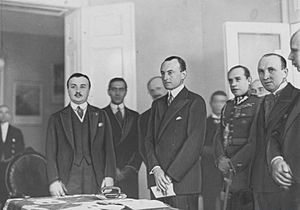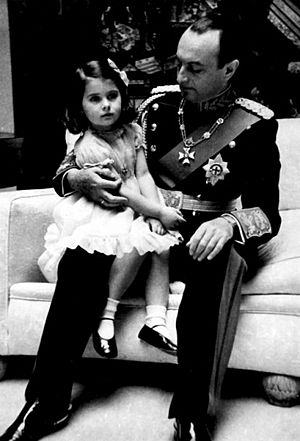Prince Paul of Yugoslavia facts for kids
Quick facts for kids Paul |
|||||
|---|---|---|---|---|---|
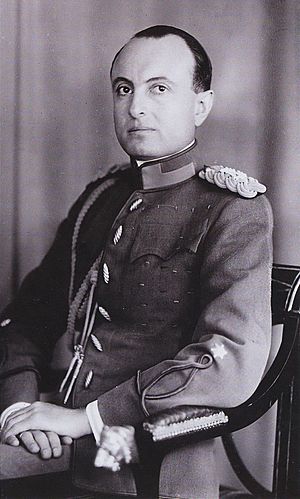
Prince Paul of Yugoslavia in 1935
|
|||||
| Prince Regent of Yugoslavia | |||||
| Tenure | 9 October 1934 – 27 March 1941 | ||||
| Monarch | Peter II | ||||
| Born | 27 April 1893 Saint Petersburg, Russian Empire |
||||
| Died | 14 September 1976 (aged 83) Paris, France |
||||
| Burial | St. George's Church, Oplenac, Serbia | ||||
| Spouse |
Princess Olga of Greece and Denmark
(m. 1923) |
||||
| Issue |
|
||||
|
|||||
| House | Karađorđević | ||||
| Father | Prince Arsen of Yugoslavia | ||||
| Mother | Aurora Pavlovna Demidova | ||||
| Religion | Serbian Orthodox | ||||
| Military career | |||||
| Allegiance | |||||
| Years of service | 1911–1935 (active service) | ||||
| Rank | Army General | ||||
| Unit | Cavalry | ||||
| Styles of Prince Paul of Yugoslavia |
|
|---|---|
 |
|
| Reference style | His Royal Highness |
| Spoken style | Your Royal Highness |
Prince Paul of Yugoslavia, also known as Paul Karađorđević (Serbo-Croatian: Pavle Karađorđević, Павле Карађорђевић; 27 April 1893 – 14 September 1976), was a prince regent of the Kingdom of Yugoslavia. He ruled while King Peter II was too young to take the throne. Paul was a first cousin to Peter's father, King Alexander I.
Contents
Early Life and Education
Prince Paul of Yugoslavia was the only son of Prince Arsen of Serbia. His uncle was King Peter I. Paul's mother was Princess Aurora Pavlovna Demidova.
The Karađorđević family was in exile for a time. Paul grew up in Geneva and was raised by his uncle, Petar Karađorđević. In 1903, the Karađorđević family returned to Serbia. Paul followed his uncle, who became King Petar I.
In 1912, Paul made an unusual choice for a Serbian royal. He decided to study at the University of Oxford in England. Most Serbian nobles preferred to study in Paris or St. Petersburg.
At Oxford, Paul was part of the exclusive Bullingdon Club. This club was known for its wealthy members and grand events. Paul became very fond of British culture. He often said he "felt like an Englishman."
Paul was a cultured person who enjoyed life. He collected famous paintings by artists like Monet, Titian, and van Gogh. His interests also included reading, fishing, and hunting. He often traveled to major art shows in Europe to admire and buy paintings.
Paul served briefly in the Royal Serbian Army during World War I. He joined in November 1914 and returned to Britain in May 1915. He served again from January to April 1917. Paul felt he could help Serbia more by being in London. There, he worked as a supporter for Serbia's interests.
From 1919 to 1924, Paul lived in London. He enjoyed social events with British high society. In 1923, he married Princess Olga of Greece and Denmark in Belgrade. She was the sister of Princess Marina, Duchess of Kent. The Duke of York (who later became King George VI) was his best man.
In January 1924, Paul returned to Yugoslavia. King Alexander, his cousin, valued Paul's intelligence and conversation. However, Alexander felt Paul was too understanding of Croat concerns about Yugoslavia's government. Paul believed Yugoslavia should become a federation. He thought Serb politicians were not being realistic about Croat unhappiness. Paul moved to a villa in Slovenia, where he felt more at home.
Becoming Regent of Yugoslavia
On 9 October 1934, King Alexander I of Yugoslavia was assassinated in Marseille, France. Alexander's will stated that a council of regents, led by Prince Paul, should govern Yugoslavia. This was to happen until Alexander's son, Peter II, became old enough to rule.
Paul learned of the assassination and his new role that same day. He went to the royal palace and opened the royal will. It confirmed that he would serve as regent until King Peter II turned 18 in September 1941.
Prince Paul had a more "Yugoslav" outlook than Alexander. He also favored democracy more. His main goal was to fix problems left by the previous government. He wanted to end strict control and censorship. He also aimed to bring peace to the country by solving the issues between Serbs and Croats. Paul hoped for Serbs and Croats to get along. However, he also felt it was his duty to hand over the kingdom to Peter mostly unchanged.
As Prince Regent, Paul had a lot of power. But he was not eager to use it. This led to Yugoslavia being called "a dictatorship without a dictator" during his rule. Paul did not want to be in power. He saw ruling Yugoslavia as a heavy responsibility.
Paul was very fond of Britain and Greece. He did not trust Fascist Italy or Nazi Germany.
Serbia had suffered huge losses in World War I. Because of this, Paul did not want Yugoslavia to enter another war. He preferred to keep Yugoslavia neutral. Yugoslavia had an alliance with France. However, a French investigation showed that Italy and Hungary had helped the assassins of King Alexander. France did not support Yugoslavia in blaming Italy. This made Paul doubt the French alliance.
Foreign Policy Challenges
On 24 June 1935, Paul appointed Milan Stojadinović as prime minister. Stojadinović's job was to deal with the Great Depression and the "Croat question." He believed that closer economic ties with Germany would help the economy. Germany needed food and raw materials. So, Yugoslavia's exports to Germany grew, helping its economy. This also pulled Yugoslavia into Germany's economic influence.
Yugoslavia had an alliance with France. But on 7 March 1936, Germany re-militarized the Rhineland. This meant Germany could build defenses along its border with France. This ended any hope of a French attack into western Germany if war started. This made Paul believe Yugoslavia needed to lean more towards Germany.
Paul also felt that Britain was willing to sacrifice Yugoslavia for better relations with Italy. In 1937, Stojadinović, with Paul's quiet support, tried to improve relations with Italy and Germany. Stojadinović signed an agreement with Italy on 25 March 1937. This weakened the Little Entente, an alliance Yugoslavia had with Romania and Czechoslovakia.
Paul hoped that if Yugoslavia seemed to be moving towards Italy, Britain might step in. This might pull Yugoslavia in another direction. French officials visited Belgrade to make sure Yugoslavia was still allied with France. Stojadinović's foreign policies were not popular with Serbs.
Paul and Stojadinović believed that peace could be saved by making deals with Germany. They thought the international order set up after World War I was failing. Paul started to worry about Stojadinović's desire for Yugoslavia to join the Axis powers. He felt Stojadinović was pushing away Yugoslavia's old allies too much.
During the Sudetenland crisis, Stojadinović favored the Axis. But many Yugoslav military officers supported Czechoslovakia, Yugoslavia's ally. Paul was relieved when the Munich Agreement ended the crisis. This prevented a war that would have put Yugoslavia in a difficult spot.
In January 1939, Stojadinović wanted to create a fascist dictatorship in Yugoslavia. He also wanted to divide Albania with Italy. Paul immediately said no to this plan. He felt Yugoslavia already had too many Albanians, whose loyalty was uncertain. At the same time, Croat politicians asked foreign powers to help Croats gain "liberty." They accused Stojadinović of being a tyrant.
Approaching World War II
On 4 February 1939, Paul removed Stojadinović as prime minister. This stopped Yugoslavia's move towards the Axis powers. Paul also refused to support Italy's takeover of Albania. On 15 March 1939, Germany occupied the Czech part of Czechoslovakia. This shocked Paul, as Germany took over a country that had tried to be friendly with it.
When Italy took over Albania in April 1939, Paul did not protest. This strained relations with Yugoslavia's ally, Turkey. Italy now controlled both sides of the Strait of Otranto. This meant Italy could cut off Yugoslavia from the rest of the world.
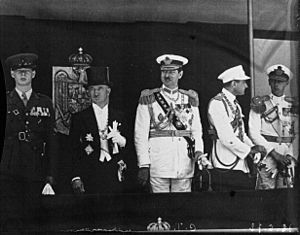
Paul supported a plan for Bulgaria to join the Balkan Pact. He urged King Carol II of Romania to give up some land to Bulgaria. Paul wanted Bulgaria to leave Italy's influence. This would allow Yugoslavia and Greece to focus on stopping Italy.
Yugoslavia also started talks with Greece to resist an Italian invasion. Yugoslavia needed modern weapons and money to buy them. Paul tried to get loans and weapons from Berlin, Paris, or London. France promised a loan of 600 million francs for Yugoslav military weapons.
Germany knew Paul was trying to play the Axis and Allied powers against each other. Germany needed raw materials like bauxite and copper from Yugoslavia for its war industry. Germany wanted Yugoslavia to supply raw materials and to join the Axis powers.
In 1939, Prince Paul visited Adolf Hitler in Berlin for nine days. Germany tried hard to convince Paul not to join the "peace front" against Germany. Paul was given a grand welcome. He met Hitler, attended dinners, visited military bases, and saw parades. Despite all this, Paul refused to sign an economic agreement that would make Yugoslavia a German economic colony. He also refused to pull Yugoslavia out of the League of Nations or sign the Anti-Comintern Pact. Hitler was very angry that Paul made so few concessions.
While in Germany, Paul sent General Petar Pešić on a secret mission to Paris and London. Pešić was to find out Anglo-French war plans. Pešić told British and French military leaders that Yugoslavia would stay neutral if Germany invaded Poland. But Yugoslavia would join the Allies once the Mediterranean and Adriatic Seas were safe.
Paul believed that Yugoslav neutrality would prevent Germany from taking its raw materials. If Yugoslavia joined the war later, when the Allies could support it, Germany would be denied these resources. Paul found the French more interested in a "second front" in the Balkans than the British.
In May 1939, Yugoslavia changed its diplomatic codes. This stopped Italy and Germany from reading its messages. Paul also spoke to the Romanian Foreign Minister about closer ties with Britain. Paul refused German and Italian demands for Yugoslavia to leave the League of Nations.
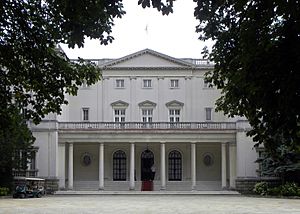
In June 1939, Paul warned the American ambassador that Germany was reading all diplomatic cables. On 15 July 1939, Paul visited London, stopping in Paris to see Pešić.
In London, Paul suggested Britain launch a "preemptive war" against Italy. He said if Italy was defeated, Yugoslavia would move closer to Britain. Paul ordered Yugoslavia's gold reserves to be sent to London. This showed his trust in Britain. He told his British hosts that Yugoslavia was moving towards joining the "peace front."
King George VI made Paul a Knight of the Garter, a very important British honor. This angered Hitler. Paul asked British leaders to attack the Italian navy and air force if war started. He believed Italy would eventually join Germany. Paul wanted an Anglo-French landing at Thessaloniki, Greece. He thought this was the only way Yugoslavia could resist a German invasion. Paul also hoped the Soviet Union would join the "peace front."
As war approached, Vladko Maček of the Croatian Peasant Party wanted to bridge the gap between Serbs and Croats. Paul supported Prime Minister Dragiša Cvetković's efforts to reach an agreement with Maček. Paul felt that ending the Serb-Croat dispute was the best way for Yugoslavia to survive the coming war.
On 20 August 1939, the Cvetković-Maček Agreement created the Banovina of Croatia. This region would be ruled by a governor and a parliament in Zagreb. Croatia gained broad self-rule. This agreement was popular with moderate Croats. However, it angered Bosnian Muslims and Serbs in Bosnia and the Krajina region. They felt "abandoned" to Croat rule. This agreement made Paul and Cvetković unpopular with Serbs. Slovenes also demanded similar self-rule.
On 26 August 1939, Paul again urged Britain to attack Italy if Germany invaded Poland. He warned that if Germany conquered Poland, Italy would join the war. Then, Italian forces in Albania, with Bulgarian support, would threaten other Balkan states. Paul feared this would cause other Balkan states to turn to Germany. The news of the Ribbentrop-Molotov Pact was a bitter blow for Paul. It meant the two strongest powers in Eastern Europe would work together. This ended Paul's hopes for an Anglo-French alliance to protect Yugoslavia from Italy.
Second World War and Exile
When World War II began in September 1939 with the German invasion of Poland, Yugoslavia declared its neutrality. Paul arranged for Yugoslavia to send more copper to Germany. In return, Germany promised to deliver weapons that Yugoslavia had already paid for. Germany also wanted Yugoslavia to refuse to join the British "peace front."
Paul wanted France and Britain to win the war, but he feared the German army. He repeatedly asked for British and French forces to land at Thessaloniki. He believed this would help Yugoslavia and make him lean more towards the Allies.
Paul even turned to the Soviet Union for help. In May 1940, Yugoslavia signed an economic agreement with the Soviet Union. In June 1940, Yugoslavia finally established diplomatic relations with Moscow. In late 1940 and early 1941, Paul tried to buy modern military equipment from the Soviet Union.
On 4 March 1941, Paul met Adolf Hitler at his home in the Bavarian Alps. Hitler told Paul he planned to invade Greece. He offered Thessaloniki to Yugoslavia if Germany could move troops through Yugoslavia. Paul refused. He said his wife was Greek, and he could not allow Yugoslavia to be used to attack Greece. Paul also admitted his sympathies were with Britain. He stated that signing the Tripartite Pact would lead to his overthrow.
On 6 March 1941, Paul held a meeting of the Yugoslav Crown Council. General Pešić said the Yugoslav army could not stop a German invasion. The next day, Yugoslavia's Foreign Minister said Yugoslavia would sign the Tripartite Pact. But he added conditions: no German troops could move through Yugoslavia to invade Greece. Paul could not allow his wife's homeland to be attacked from Yugoslavia.
On 25 March 1941, the Yugoslav government signed the Axis Tripartite Pact. They added three notes. The first note said the Axis powers must respect Yugoslavia's territory and independence. The second note promised no military help would be asked from Yugoslavia. The third note promised no military forces would move through Yugoslavia during the war.
However, many in the Royal Yugoslav Army did not like the pact. On 27 March 1941, two days after signing, Yugoslav military leaders, with British support, removed Paul from power. They declared King Peter II old enough to rule. German and Italian forces invaded Yugoslavia ten days later.
Life in Exile
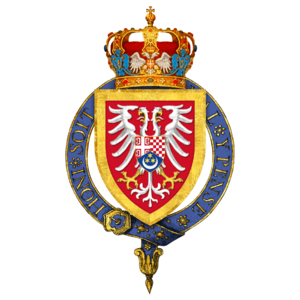
For the rest of World War II, Prince Paul and his family were kept under house arrest by the British in Kenya. They arrived at Oserian, a former home on the shores of Lake Naivasha, on 28 April 1941. The British newspapers unfairly called Paul a Nazi sympathizer, even though he liked Britain.
His sister-in-law, the Princess Marina, Duchess of Kent, and her husband, the Prince George, Duke of Kent, asked Winston Churchill to let Paul and Princess Olga live in Britain. But Churchill refused. After the Duke of Kent died in 1942, Churchill allowed Olga to visit her sister in London.
Paul's old friend, South African Prime Minister Jan Smuts, asked Churchill to release Paul. Paul was finally freed in 1944 and allowed to live in Johannesburg, South Africa. Smuts gave Paul and his family a safe place to live.
Paul lived in South Africa until 1949. Then, he moved to Paris, France. He spent his summers at his villa in Tuscany, Italy. His neighbor was his old friend, the wealthy art historian Bernard Berenson. Paul continued to add to his art collection.
After the war, the Communist government in Yugoslavia declared Prince Paul an enemy of the state. They banned him from returning to Yugoslavia and took all his property there.
Prince Paul was the father of Princess Elizabeth, Prince Alexander, and Prince Nikola. He was also the grandfather of American author Christina Oxenberg and American actress Catherine Oxenberg.
Burial
Prince Paul died in Paris on 14 September 1976, at age 83. He was first buried in Lausanne, Switzerland.
In 2011, Serbian courts cleared Prince Paul's name. On 6 October 2012, he was reburied at the family crypt in Oplenac, Serbia. His wife Olga and son Nikola were also reburied there.
Legacy and Art Collections
Paul's only daughter, Princess Elizabeth, published a biography of her father in the 1990s. It included information from British government files. The original book, Paul of Yugoslavia: Britain's Maligned Friend, was written by Neil Balfour in 1980.
The Serbian historian Srdja Trifković described Prince Paul as a "tragic figure." He said Paul was an art-lover who was forced into the world of politics. He was an Anglophile who had to make deals with Britain's enemies. He was a gentleman in a difficult world. Trifković wrote that Paul was not truly loved in Belgrade, trusted in Berlin, or respected in London.
Prince Paul, along with King Alexander I, collected and donated many artworks to Serbia. These included important Italian, French, and Dutch/Flemish pieces. Most of these works are now in the National Museum of Serbia. They include paintings by famous artists like Rubens, Renoir, Monet, Titian, Van Gogh, and Paul Gauguin.
Honors and Awards
Prince Paul received many honors from Serbia, Yugoslavia, and other countries. These awards recognized his service and position.
| Serbian and Yugoslavian decorations | |
| Order of the Karađorđe's Star, Knight Grand Cross | |
| Order of the White Eagle, Knight Grand Cross | |
| Order of the Yugoslav Crown, Knight Grand Cross | |
| Order of St. Sava, Knight Grand Cross | |
| Serbian Service Medals | |
| Commemorative Medal of the Election of Peter I as King of Serbia | |
| Commemorative Medal of the Albanian Campaign | |
| Medal of the Serbian Red Cross | |
| Foreign Honours | |
| Order of Carol I, Grand Collar | |
| Royal Victorian Order, Honorary Knight Grand Cross | |
| Order of the Garter, Stranger Knight | |
| Sovereign Military Order of Malta, Bailiff Grand Cross | |
| Order of the Elephant, Knight | |
| Legion of Honour, Knight Grand Cross | |
| Order of the Redeemer, Knight Grand Cross | |
| Order of George I, Knight Grand Cross | |
| Supreme Order of the Most Holy Annunciation, Knight Grand Cross | |
| Order of Saints Maurice and Lazarus, Knight Grand Cross | |
| Order of the White Lion, Collar | |
| Order of the Crown of Italy, Knight Grand Cross | |
| Order of the Golden Fleece, Knight | |
| Order of Merit of the Kingdom of Hungary, Knight Grand Cross with Holy Crown and Collar | |
| Order of St. Alexander, Knight Grand Cross in Diamonds | |
See Also
 In Spanish: Pablo de Yugoslavia para niños
In Spanish: Pablo de Yugoslavia para niños



